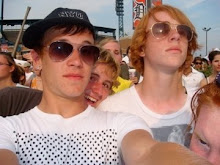
R.C. Harvey's examination of "Lorelie Rox" illumines (no pun intended) details of the story that we discussed in class, with the added benefit of some context, but he doesn't break much new ground. It doesn't take an extremely insightful reader to notice what an important role lighting plays in the opening pages of this story, but it helps to know Eisner's impetus for pushing the medium as much as he did. It's hard not to respect the man more for returning from war and still feeling that humor serves an important role in storytelling, for having the drive to present "fables, modern morality dramas [...] the supernatural, the inexplicable [...] science fiction [...] music [...] and poetry," all under one banner. It's not a shame that he left his monumental creation to push the medium in different directions, only that more creators couldn't learn from his work. Even the most progressive writers since Eisner -- Moore, Ellis, Morrison -- don't always maintain the narrative clarity that Eisner kept hold of throughout his experimental works. Maybe they should try a stint in the army.

Stephen,
ReplyDeleteI looked up the film-noir film and other influences on Eisner's THE SPIRIT. Here is good link that gives a time-line concerning radio shows, comic strips and film-noir films from which Eisner was influences:
http://www.detnovel.com/OtherMedia.html
However, it does not reference what is credited to be the first U.S. film-noir film, THE MALTESE FALCON (1941).
Also, thought Eisner left the comic book world for over 25 years, he came back with a vengeance and wrote the first "graphic novel," A CONTRACT WITH GOD."
Cynthia